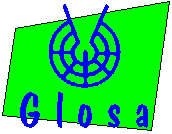
Glosa, an International Auxiliary Language
Index: The Language Glosa - Learning- and Textmaterial - Links - Glosa Mailing-List - Glosa Organisation.
... and to the words.

Index: The Language Glosa - Learning- and Textmaterial - Links - Glosa Mailing-List - Glosa Organisation.
... and to the words.
Glosa is an international auxiliary language (auxlang), that was developed by Lancelot Hogben (as Interglossa, GB, 1943), Ronald Clark and Wendy Ashby (GB, 1972-1992). An auxlang is an artificial language that should help the communication between speakers of different native languages and so be a supplement to the national languages.
There are hundreds of drafts for such languages. Glosa is the most advanced
one of the type that linguists call isolating. That means, that in Glosa
there are no inflections. Words remain always in their original form, no matter
what function they actually have in the sentence. A conventional grammar is
missing. Although Glosa is a full language. Grammatical functions are taken over
by some operator words and the word order (syntax). This disposition brings
Glosa relationship with many languages around the world: east-Asiatic languages
like Chinese, Creolean languages from Africa, pidgin languages and with
reservation the most important natural language - English.
(In my personal
opinion this way is not only interesting, but also the best for an auxlang.)
A Glosa word represents an idea, but no part of speech. The same word can function as a verb, noun, adjective or preposition within reason. The Glosa words are taken from Latin and Greek. So they are known to many people by foreign words or by the Roman languages. A limitated vocabulary (Glosa 1000 or Centra Glosa), easy to learn for beginners, should satisfy for all day situations. For higher demands (science, art, poetry) an extension (Glosa 6000 or Mega Glosa) is available.
The pronounciation is simple and regular. Its model was Italian and it is similar to German. Glosa is written with the Latin alphabet without special characters, there are no double vowels or consonants.
There is a yahoo-group for Glosa: groups.yahoo.com/group/glosalist. You are welcome to register and take part. Messages can be either in English about Glosa or in Glosa about any subject.
Behind this "Organisation" there is only the Glosa author Wendy Ashby, after Ron Clark died in June of 2000. You can write to her also in German. The address is
Glosa Education Organization
P. O. Box 18
Richmond
Surrey TW9 2GE
England
Glosa author Wendy Ashby wrote about this website: "... Mega gratia de tu auxi difusi Glosa - tu puta-me pagina es fo stimula! Id sti memo mi de u proto-tem mi pa vide Glosa - id es ta facili e habe mega pote pro munda paci e kon-ergo. ...".
Marcel Springer, http://www.glosa.org/, last modified September 29th, 2004.
(E-mail:  .
Please send only plain ASCII messages about Glosa without attachments.
Thanks. - Personal homepage with
imprint, older statistics/webcounting.)
.
Please send only plain ASCII messages about Glosa without attachments.
Thanks. - Personal homepage with
imprint, older statistics/webcounting.)